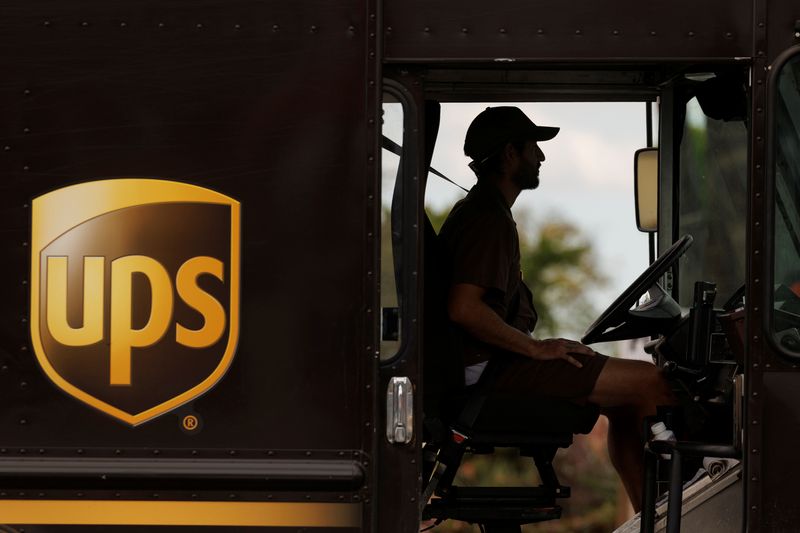By Lisa Baertlein and Ananta Agarwal
(Reuters) -United Parcel Service plans to cut 12,000 jobs and explore strategic options for Coyote, its volatile trucking brokerage business, after the world's largest parcel delivery company forecast full-year revenue below Wall Street's target.
Shares of Atlanta-based UPS tumbled 8% to $145.32 on the New York Stock Exchange amid weak demand from its retail, manufacturing and high tech customers.
The company plans to cut $1 billion in costs as it comes off a "difficult and disappointing" year, when volume, revenue and operating profit declined in all of its business segments, UPS CEO Carol Tome said on a conference call with analysts.
Tome also said UPS hopes to find a new way to offer the "very low-margin" services that Coyote provides without the overhead. Coyote's revenue topped $4 billion during the height of the COVID-19 pandemic shipping boom, but "it's come way down since then," she said.
UPS, seen as a bellwether for the global economy, does not expect business conditions to improve until the second half of 2024. On Tuesday, it forecast full-year revenue of $92 billion to $94.5 billion, below analysts' average target of $95.57 billion, according to LSEG data.
UPS, FedEx (NYSE:FDX) and other delivery firms boomed in the early days of the pandemic, when home-bound consumers binged on everything from furniture and exercise equipment to sweat pants and televisions.
That trend reversed when travel, concerts and indoor dining resumed, and the resulting drop was exacerbated by inflationary pressures that crimped some e-commerce purchasing.
Both UPS and FedEx have been forced to cut forecasts in the still-uncertain business environment.
TEAMSTERS CONTRACT
The 2024 revenue estimate from UPS is likely conservative enough that the company will "not have to come back and do this again next quarter," said Arthur Hogan, chief market strategist at B. Riley Wealth, referring to the forecast reductions.
Higher labor costs from the new contract with its Teamsters union are also squeezing profits at UPS, which expects to report its lowest consolidated operating margin of the year in the first quarter, UPS Chief Financial Officer Brian Newman said on the call with analysts.
UPS said it has been winning back business that went to rivals like FedEx during the company's tumultuous labor talks that wrapped up last summer. Sixty percent of that business has returned, Tome said.
UPS expects its average daily volume to pick up in the latter half of this year, but even then, growth will be constrained.
"The small package market in the U.S., excluding Amazon (NASDAQ:AMZN), is expected to grow by less than 1%," Tome said. Amazon accounted for 11.8% of UPS revenue last year.
Meanwhile, customers are shifting to less lucrative ground-based delivery from more profitable air-based services - dinging profits at both UPS and FedEx.
For the fourth quarter, UPS reported a 6.9% decline in revenue from its air-based international segment due to significant softness in Europe and 7.3% decline in its truck-based U.S. business.

The company reported quarterly revenue of $24.9 billion, down 7.8% from a year earlier and below analysts' target of $25.43 billion.
Adjusted profit fell 31.8% to $2.47 per share, but was still a penny per share better than analysts' estimate.